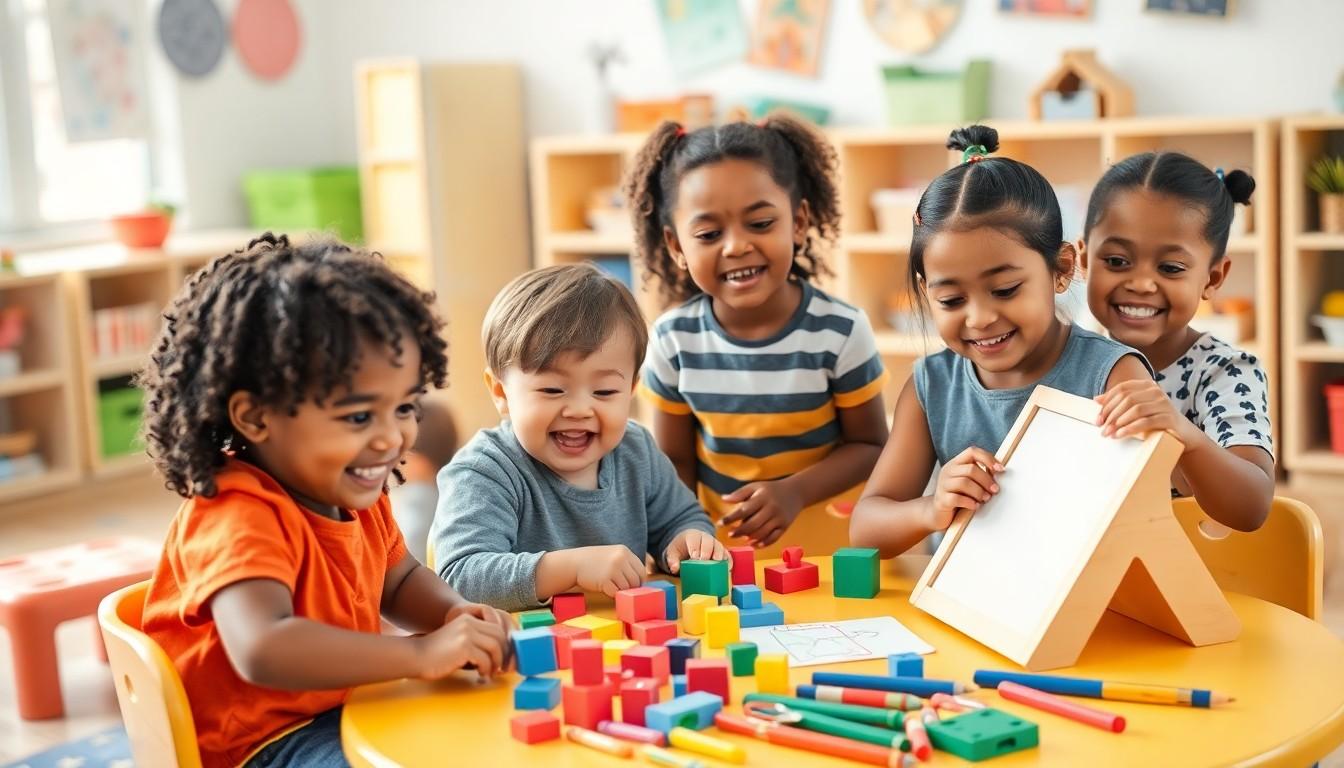Early education shapes a child’s future in profound ways – and Legacy Preschool stands at the forefront of transformative early learning experiences. This innovative institution combines time-tested teaching methods with modern educational approaches to create an environment where young minds flourish.
Legacy Preschool isn’t just another daycare center – it’s where tomorrow’s leaders take their first steps toward academic excellence. With state-of-the-art facilities and a curriculum designed by leading childhood education experts this preschool has earned its reputation as a launching pad for lifelong learning. Their unique approach balances structured activities with creative play ensuring children develop both essential skills and a genuine love for learning.
Table of Contents
ToggleWhat Is Legacy Preschool Education
Legacy Preschool Education represents a comprehensive early learning system that integrates developmental milestones with academic foundations. This educational approach prioritizes both cognitive growth and social-emotional development in children ages 2-5 years.
Core Educational Philosophy
Legacy Preschool’s educational philosophy centers on creating empowered learners through experiential discovery. The program emphasizes five key elements: individual learning paths, cultural awareness, emotional intelligence, critical thinking skills and creative expression. Teachers guide children through developmentally appropriate activities that promote independence, curiosity and problem-solving abilities. The classroom environment incorporates multi-sensory learning tools, hands-on materials and interactive technology to engage different learning styles.
Curriculum Framework
The curriculum structure follows research-based developmental benchmarks across six core domains:
- Language & Literacy: Phonics instruction, vocabulary building and early reading skills
- Mathematical Concepts: Number recognition, basic operations and spatial relationships
- Scientific Inquiry: Observation skills, cause-effect relationships and natural world exploration
- Social Studies: Community awareness, cultural diversity and environmental responsibility
- Creative Arts: Music, movement, visual arts and dramatic play
- Physical Development: Fine motor skills, gross motor coordination and health awareness
Each domain includes measurable learning objectives, progress monitoring tools and differentiated instruction strategies. Monthly themes integrate multiple subjects while maintaining consistency in skill development across age groups.
Key Benefits of Legacy Preschool Programs

Legacy Preschool programs deliver measurable advantages that extend far beyond early childhood. These specialized programs create a foundation for lifelong learning through structured developmental approaches.
Academic Preparation
Legacy Preschool’s academic curriculum introduces fundamental concepts through interactive learning experiences. Students develop essential pre-reading skills including phonemic awareness, letter recognition, and basic vocabulary building. Mathematical foundations emerge through hands-on activities with counting, patterns, shapes, and basic number operations. Children engage with science concepts through guided experiments, nature exploration, and sensory activities. The programs incorporate technology-enhanced learning tools that reinforce cognitive development across multiple subjects. Teachers document each child’s progress using standardized assessment methods to ensure mastery of key academic milestones.
Social-Emotional Development
The structured environment at Legacy Preschool cultivates crucial interpersonal abilities through daily peer interactions. Students learn emotional regulation techniques during guided play sessions and group activities. The curriculum emphasizes sharing, turn-taking, and collaborative problem-solving through teacher-facilitated exercises. Children practice communication skills during circle time, storytelling sessions, and dramatic play opportunities. Teachers model positive behaviors and coach students through conflict resolution scenarios using age-appropriate strategies. The programs foster independence through self-help skills practice and decision-making opportunities in classroom routines.
Essential Components of Legacy Preschools
Legacy preschools incorporate three fundamental elements that create an optimal learning environment for young children. These components work together to establish a strong educational foundation during the crucial early development years.
Qualified Teaching Staff
Teachers at legacy preschools hold advanced degrees in early childhood education or related fields with specialized certifications in child development. Each classroom maintains a 1:8 teacher-to-student ratio, enabling individualized attention for every child. Lead teachers undergo 40+ hours of annual professional development, covering topics like emergent literacy, STEM education, social-emotional learning strategies. The teaching teams collaborate during weekly planning sessions to create differentiated lessons that address multiple learning styles. Master teachers mentor new staff members through a structured 3-month orientation program focusing on classroom management, curriculum implementation, assessment methods.
Learning Environment
Legacy preschool classrooms feature dedicated learning centers equipped with age-appropriate materials that promote exploration and skill development. Each room includes a literacy corner with 200+ books, a manipulatives area for fine motor skills, dramatic play spaces for social development. The outdoor learning environment spans 5,000 square feet with natural elements like garden beds, water features, climbing structures. Indoor spaces incorporate sound absorption materials, natural lighting, flexible seating options to accommodate different learning preferences. Learning centers rotate materials monthly to maintain engagement while supporting current curriculum themes.
Parent Involvement
Parents participate in quarterly conferences to review developmental progress reports and set individualized learning goals. The parent portal provides daily updates on activities, meals, rest periods through a secure mobile application. Monthly workshops offer guidance on supporting learning at home, addressing common developmental concerns, establishing consistent routines. Parents volunteer in classrooms during special events, cultural celebrations, field trips throughout the academic year. Regular surveys collect feedback on program effectiveness, communication methods, suggested improvements to enhance the partnership between home and school.
Choosing the Right Legacy Preschool
Selecting an appropriate Legacy Preschool requires careful evaluation of multiple factors that align with a family’s educational goals. A systematic approach ensures the chosen preschool meets both the child’s developmental needs and the parents’ expectations.
Assessment Criteria
Legacy Preschool evaluation focuses on five key areas:
- Teacher Qualifications: Advanced degrees in early childhood education plus ongoing professional development certifications
- Classroom Environment: Maximum 1:8 teacher-student ratio with designated learning centers for each developmental domain
- Safety Protocols: Security systems active supervision policies health safety measures
- Curriculum Implementation: Evidence-based programs aligned with state standards age-appropriate learning materials
- Family Engagement: Regular parent-teacher conferences documented progress reports family education workshops
Questions to Ask
- “What teaching methodologies do you implement in daily instruction?”
- “How do you track individual student progress?”
- “What methods support children’s social emotional development?”
- “Can you describe your emergency response procedures?”
- “How often do you communicate student progress to families?”
- “What opportunities exist for parent involvement?”
- “What percentage of your teachers hold advanced education degrees?”
| Assessment Factor | Required Standard |
|---|---|
| Class Size | Maximum 16 students |
| Teacher Education | Minimum Bachelor’s degree |
| Daily Schedule | 6 hours structured learning |
| Assessment Frequency | Quarterly evaluations |
| Parent Conferences | Monthly meetings |
Modern Adaptations in Legacy Education
Legacy Preschool education evolves continuously to meet contemporary learning needs through innovative adaptations. These modifications enhance the traditional curriculum while maintaining core educational principles.
Technology Integration
Digital learning tools complement Legacy Preschool’s hands-on curriculum through interactive smartboards, educational tablets, and age-appropriate coding activities. Students engage with STEM concepts using specialized apps that track individual progress and adapt to each child’s learning pace. Learning management systems enable teachers to document student achievements, share progress reports with parents, and customize lesson plans. Virtual field trips transport children to museums, zoos, and cultural landmarks, expanding their worldview beyond classroom walls. Digital portfolios capture student work samples, developmental milestones, and learning experiences through photos, videos, and documentation.
Cultural Inclusivity
Legacy Preschools embrace diversity through multilingual learning materials, multicultural celebrations, and globally-inspired activities. Classrooms feature books, music, and art representing various cultures, languages, and traditions. Teachers incorporate cultural perspectives into daily lessons, teaching respect for differences and celebrating unique family backgrounds. The curriculum includes traditional songs, dances, and stories from different regions, fostering global awareness. Community partnerships bring cultural experts into classrooms for authentic learning experiences. Diverse staff members reflect the student population, providing role models and cultural mentors for young learners.
Conclusion
Legacy Preschool stands as a beacon of excellence in early childhood education offering far more than traditional daycare services. Its comprehensive approach combines proven teaching methods with innovative strategies creating an environment where young minds flourish.
Through qualified educators state-of-the-art facilities and a research-based curriculum Legacy Preschool sets children on a path to lifelong learning success. The institution’s commitment to holistic development ensures that every child receives the foundation they need for future academic achievement.
Parents seeking quality early education will find Legacy Preschool’s blend of structured learning creative play and technological integration provides their children with the tools needed to thrive in today’s dynamic world.


